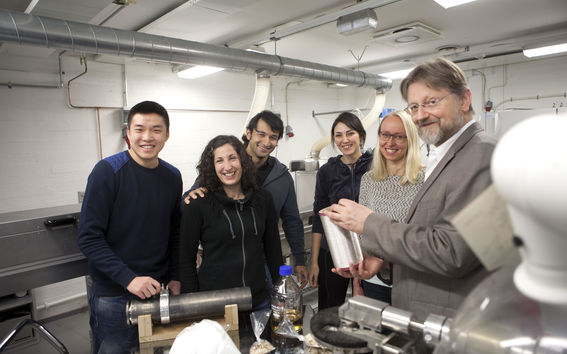Doctoral research is shedding new light on recycling
A research collaboration with industry partners is improving the recycling of milk and juice cartons

Co-funded research projects include for example:
In addition to the university, co-funded research projects can involve a variety of actors, such as companies, other universities, research institutes and other public organisations. Co-funded collaborative research allows companies and organisations to participate in a variety of ways and to network and share information with other project partners. Participation in a joint project can even open up new customer or business partnerships within the network.
In most cases, the main source of funding for a project is competitive project funding from, for example, Business Finland, the Research Council of Finland or the EU. Part of the funding usually comes from the consortium's participating companies and the research organisations themselves.
It should be noted that consortia projects can take even more than a year to prepare and apply for funding. Projects usually take 2-4 years to complete.
Cofunded projects are always expected to produce academic outputs, such as publications, and often also to disseminate the resulting knowledge widely for the use of the consortium and the rest of society. The modalities and content of publications and their preparation will be agreed in the consortium agreement in such a way that trade secrets and patentable results are adequately protected.
Before the cooperation starts, the ownership of intellectual property rights (IPR) and possible ways to exploit the resulting IPR are agreed. The IPR of a project usually depend on the funding organization and the funding instrument used. In principle, the IPR generated during the project belong to the organisation whose employee has made the invention. If the invention involves employees from more than one organisation, the IP rights are owned jointly by those organisations. If the consortium partners wish to exploit the results in their business activities, the redemption of the ownership and use rights and the compensation payable may be negotiated separately afterwards.
Virpi Puhakka, Ecosystem Director, Valmet OyjInstead of producing scientific research that is just filed away, Stora Enso's materials, our pilot possibilities, and the university's research laboratories are used extensively.
The co-funded model allows a company or organisation to participate in university research with a partial financial contribution. This is a good way to establish long-term research cooperation, especially when researching entirely new technologies or acquiring new skills that will boost future competitiveness. In particular, doctoral thesis projects can be carried out through co-funded projects.
When the research topic is of particular academic interest to the university and funding is available, a bilateral project agreement can be used to initiate cooperation. The principles of IPR are similar to those for co-funded consortium research.
If you would like to get involved in a long-term collaboration that will increase your future opportunities but do not know where or how to start, contact the Aalto Corporate Relations team. We will help you find the right partner among our experts to help you refine your research idea.

A research collaboration with industry partners is improving the recycling of milk and juice cartons

Generative AIs like ChatGPT will revolutionise the business world, but so far no one knows how – new research project explores best practices and seeks solutions to pitfalls

Researchers at Aalto are creating a digital model for automatic continuous predictive process simulations supporting wastewater treatment plant operation in a new project called DIGICARBA. The proposed digital tool will have a wastewater treatment process model connected to continuous data transmission from the Helsinki wastewater treatment plant.

The FinnFiberColor project develops sustainable solutions for manufactured cellulose fibre processes. The project has enhanced the understanding of the properties of new kinds of textile fibres and assessed the consumer perception of fabrics created from alternative materials.

Join us in building a sustainable future! Together we can solve some of the toughest problems of our time.